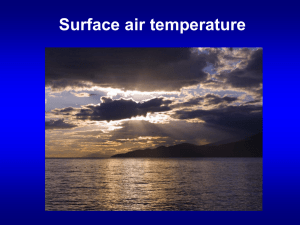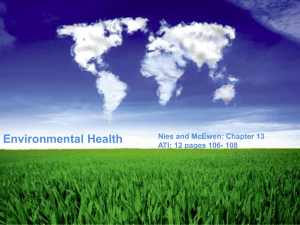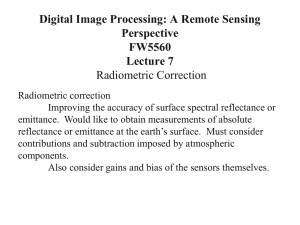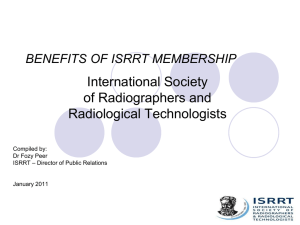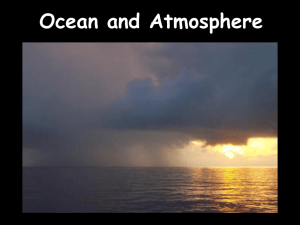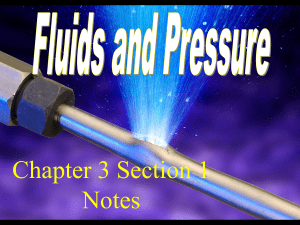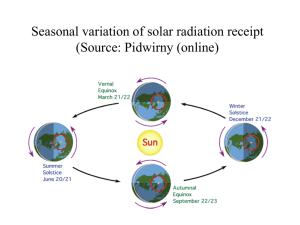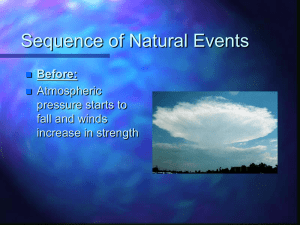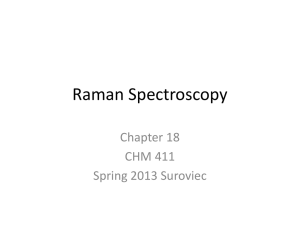PHY2505-Lecture8
advertisement
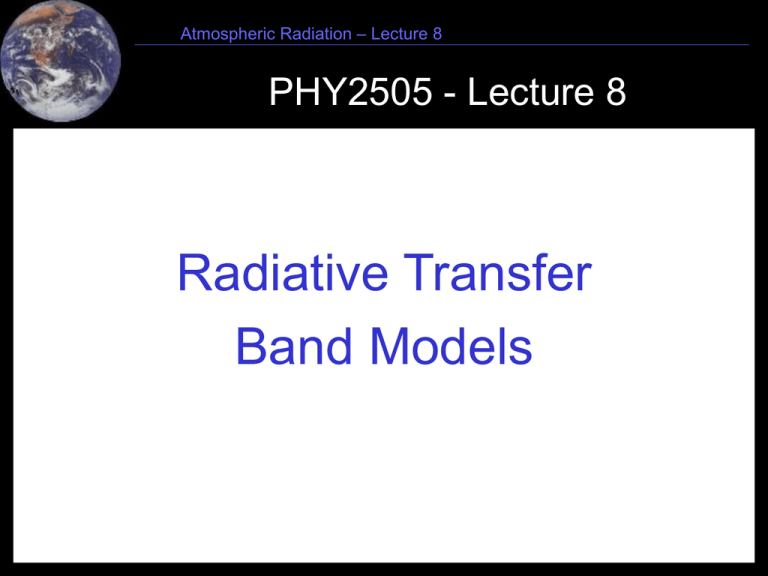
Atmospheric Radiation – Lecture 8 PHY2505 - Lecture 8 Radiative Transfer Band Models 1 Atmospheric Radiation – Lecture 8 Outline • • • • • Equivalent width Weak line/strong line approximations Band models Curtis-Godson approximation MODTRAN 2 Atmospheric Radiation – Lecture 8 Equivalent width Consider a homogenous atmospheric layer. Here the spectral absorption coefficient does not depend on path length. The spectral transmittance T for a band of width Dv is And spectral absorptance, A Equivalent width, W [cm-1]: a measure of absorptance, A, over the spectral interval Dv 3 Atmospheric Radiation – Lecture 8 Equivalent width of a Lorentz line 4 Atmospheric Radiation – Lecture 8 Equivalent width of a Lorentz line 5 Atmospheric Radiation – Lecture 8 “Weak line” limit 6 Atmospheric Radiation – Lecture 8 “Strong line” limit 7 Atmospheric Radiation – Lecture 8 Strong/weak line: limits of validity Can find experimentally from “curves of growth” 8 Atmospheric Radiation – Lecture 8 Band models A band is a spectral interval of a width Dv small enough to use a mean value of the Planck function Bv(T) but large enough to contain several absorption lines Band models are introduced to simplify computation of spectral transmittance Now we have found out how to calculate the equivalent width of a single line, need to consider how we deal with a band of many lines Two main cases: 1)Lines with regular positions 2)Lines with random positions 9 Atmospheric Radiation – Lecture 8 Regular Elasser band model This gives See Liou p139-141 for derivation 10 Atmospheric Radiation – Lecture 8 Principle of statistical band models 11 Atmospheric Radiation – Lecture 8 Principle of statistical band models where d is the mean spacing For multiple lines, transmission is exponential in W 12 Atmospheric Radiation – Lecture 8 Goody statistical model 13 Atmospheric Radiation – Lecture 8 Goody statistical model: weak and strong line limits 14 Atmospheric Radiation – Lecture 8 Correlated k distribution Here, the spectral lines are rearranged over a given spectral interval and a histogram produced Absoprtion coefficient for representative lines is multiplied by a weighting function representing frequency of occurance of this type of line Typically useful to use 4 divisions per decade on log scale … See Liou section 4.3 for a discussion of the limits of validity for this approximation Liou, FIG 4.5 15 Atmospheric Radiation – Lecture 8 Curtis – Godson approximation 16 Atmospheric Radiation – Lecture 8 Curtis – Godson approximation 17 Atmospheric Radiation – Lecture 8 Curtis – Godson approximation 18 Atmospheric Radiation – Lecture 8 Curtis – Godson approximation 19 Atmospheric Radiation – Lecture 8 MODTRAN4 A. Berk *, G.P. Anderson #, P.K. Acharya *, J.H. Chetwynd #, M.L. Hoke #,L.S. Bernstein *, E.P. Shettle ^, M.W. Matthew *, and S.M. Adler-Golden # US Air Force Research Laboratory *Naval research Laboratory 2cm-1 resolution • Atmosphere: gas profiles, temperature, pressure profiles, aerosol/cloud type & vertical distribution • Surface type & measurement geometry • 20 ) Select calculation methods: eg. correlated K method, scattering (DISTORT Atmospheric Radiation – Lecture 8 Who still uses band models (MODTRAN)? UV/VIS atmospheric instruments where scattering important Eg. SCISAT-1 MAESTRO McElroy, C.T. , A spectroradiometer for the measurement of direct and scattered solar spectral irradiance from on-board the NASA ER-2 high-altitude research aircraft, Geophys. Res. Lett., 22, 1361-1364 (1995). Multispectral imagers cloud, ozone, water vapour retrieval Eg. MODIS Justice, C.et al, The Moderate Resolution Imaging Spectroradiometer (MODIS): Land remote sensing for global change research, IEEE Trans. Geosci. Remote Sens., 36, 1228-1249 (1998). Hyperspectral imagers for atmospheric corrections Eg. AVIRIS Berk, A, et al, MODTRAN Cloud and Multiple Scattering Upgrades with Application to AVIRIS, Remote Sens. Environ., 65, 367-375 (1998). 21 Atmospheric Radiation – Lecture 8 MODTRAN dialogue windows 22
